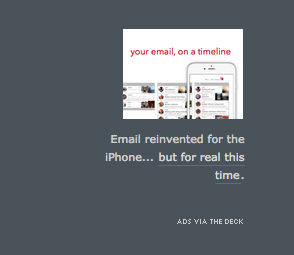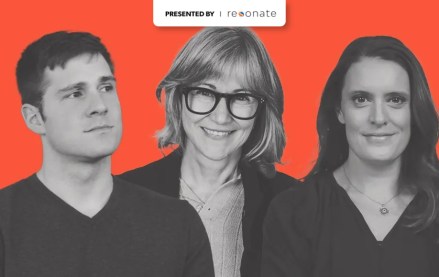Old-school ad network The Deck on ad blocking: ‘We’re paying for everyone else’s sins’

The Deck is an ad network that’s conspicuously low on ad tech.
At a time when ad tech is all about scale, consumer tracking and intrusive ads, The Deck has taken a softer, almost print-like approach. Its ads are small, static and designed to fit within pages rather than distract readers, and The Deck doesn’t track readers. “We’re fine with knowing nothing,” it recently proclaimed.
But even that model has been tested in the wake of the ad blockalypse. The Deck’s ads were recently at the center of a debate between prominent Apple blogger John Gruber and Marco Arment, whose now-defunct iOS ad blocker Peace, like most of its counterparts, blocked The Deck’s ads by default. The fact that ad blockers block even comparatively unobtrusive ads such as those from The Deck was part of the reason Arment pulled his ad blocker from the App Store.
“We’re definitely paying for everyone else’s sins,” said The Deck founder Jim Coudal. “When we built this, we saw bullshit like people putting six ads on a page and counting every impression equally for all of them. The reasons for our existence are even more valid now than they were a decade ago.”
The Deck runs counter to many ad tech companies in its willingness to sacrifice scale in the name of quality. It has only 42 publishing partners, including Daring Fireball and design blog Swissmiss and mobile apps Twitterific and Instapaper. It only offers 33 ad slots each month, which it sells for $8,900 each. Publishers have to work exclusively with The Deck, to ensure they can’t “fill their pages with punch-the-monkey ads,” as Coudal put it. The Deck, whose ads are sold at a $3 to $4 CPM, served 92 million impressions in June.

The Deck is equally selective on the advertiser side. Its advertisers, which have been largely limited to tech darlings such as Squarespace, Mailchimp and Cards Against Humanity, can’t cherry-pick the sites they want their ads to appear on nor can they target them by location or based on any kind of demographic data — none of which The Deck actually collects. All this has, largely by design, constrained how much The Deck has been able to grow.
“We don’t offer a lot of that kind of data and targeting, which may make this thing not very scalable, but we’re OK with that,” Coudal said, adding that The Deck has lost some business because of its data and targeting limitations.
To advertisers, those limitations might make The Deck seem out of step. But the brands that work with the network say that its lack of intrusive ads, strict advertiser vetting process and uncluttered ad environments make up for the lack of data they get.
“They have an audience that we’re trying to reach,” said Alex Franceschini, acquisition manager at domain registrar company Hover, which has worked with The Deck since 2014. “You can get the data and tracking from plenty of places if you want to.”
Ultimately, The Deck’s goal is to serve all sides of the advertising equation equally well. Advertisers get a quality advertising environment, publishers get consistent revenue, and readers get ads that don’t interrupt them or follow them across the Web. Some ads might even be a bit helpful. “As things have progressed, the reader has been pushed further and further from the table,” Coudal said.
Which, in the end, is why The Deck has no intention of trying to outfox readers who use ad blockers.
“We’re either going to rise or fail on our merits,” said Coudal. “And if we fail — well, that’s the way it goes.”
More in Media

Digiday+ Research: Publishers take their focus off events as revenue dips
The percentage of publishers making money from events hit a low as of the first quarter of this year and, as a result, fewer publishers plan on putting a focus on growing that part of their business.

What platforms, brands and agencies hope to get out of the Possible conference in year 2
Year two of Possible is once again being held in Miami Beach, and it will take place from April 15-17 with 3,000 attendees expected to listen to another 200 or so speakers, including Snap’s Colleen DeCourcy, Uber Ads’ Megan Ramm and UM Worldwide’s Matthew Smith.

AI Briefing: Cloud giants’ AI ambitions create new partnerships — and new competitive concerns
Last week, tech companies like Google, Microsoft and Amazon all announced updates more updates for their cloud and AI efforts





